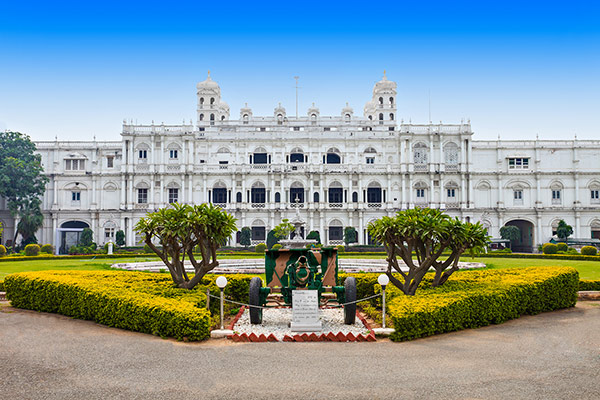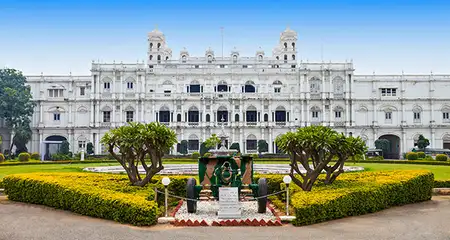Famed for its colossal Durbar Hall, the Jai Vilas Palace aka the Jai Vilas Mahal in Gwalior stands as an ode to opulence. This 19th-century palace is a spectacular royal residence cum museum that boasts of splendid architecture and a grand collection of curios, some of which belong to the times of Mughal Emperors and the legendary queen Lakshmibai of Jhansi. This extravagant edifice built on a grand scale should be on your itinerary when you step out of your hotels in Gwalior to explore the city.
Interested to know more about this heritage palace? Here’s everything about the Jai Vilas Palace in Gwalior, including its history, architecture, timings, entry fee, other interesting and lesser-known facts.
Jai Vilas Palace, Gwalior Information:
| Location | Lashkar, Gwalior |
| Type | Royal Palace |
| Timings | 10:00 am to 4:30 pm; closed on certain public holidays |
| Entry Fee | ₹ 150 for Indians; ₹ 800 for foreigners; free entry for children up to 5 years and differently-abled visitors |
| Still Camera/Mobile | ₹ 100 |
| Video Camera | ₹ 300 |
| Year of Construction | 1874 |
| Commissioned by | Maharaja Jayajirao Scindia |
| Architectural Style | Italian-Doric, Tuscan, and Corinthian architecture |
| Architect | Sir Michael Filose |
| Current Owner | Jyotiraditya Scindia |
| Area | 1,240,771 square feet |
| Cost of Construction | 1 crore Indian rupees |
| Status | Museum (a part of the palace) and the residence of the heirs of the Maratha Scindia Dynasty |
Jai Vilas Palace, Gwalior: History
The Jai Vilas Palace was constructed in 1874 by Jayajirao Scindia of the Maratha Scindia Dynasty, the then Maharaja of Gwalior. The majestic palace was built to extend a grand welcome to the then Prince of Wales, King Edward VII, for his visit in 1875. Constructed at a whopping cost of 1 crore rupees, the palace was designed to be an exceptional feat in grandeur at every level. It went on to become an imperial residence for the members of the Scindia royal family.
Much later, a section of the palace was turned into a grand museum under the orders of Rajmata Vijayaraje Scindia. She created the museum to honor the memory of her husband, Jivajirao Scindia, who was the last Maharaja to rule over Gwalior. The museum, which is named HH Maharaja Sir Jiwajirao Scindia Museum, was inaugurated on 12th December 1964 by Dr. Sarvapalli Radhakrishnan, the then president of India.
Book Couple friendly Hotels in Gwalior
Jai Vilas Palace Architecture
The Jai Vilas Palace is a splendid portrayal of European architecture. Designed by the famous architect Sir Michael Filose, the stunning three-storied palace exhibits the Tuscan style of architecture in the first story, a blend of the Italian-Doric style in the second story, and the Corinthian style in the third story. The edifice covers an area of 1,240,771 square feet, making it one of the top tourist places to visit in Gwalior.
There are 400 rooms in this sprawling palace, featuring Italian marble flooring, ornate accessories, lavish Persian carpets, and rare antiquities from various parts of the world. The Durbar Hall is the most magnificent part of this palace while there is also a massive Banquet Hall adorned with an elongated dining table. A unique attraction of the dining table is the silver train with carriages designed out of cut glass. This train was used as a trolley to serve food, cigars, and brandy to guests seated around the table.
The rooms of this regal residence cum museum are decorated with a variety of items and artifacts carrying immense historical significance. The palace has an indoor swimming pool designed for the women of the royal household, which boasts of a boat as well.
Jai Vilas Palace, Gwalior: Today
Today, the Jai Vilas Palace serves as the royal residence of the Maratha Scindia family’s descendants. At the same time, it houses the Jiwajirao Scindia Museum and a vast library containing more than 7,000 books belonging to various genres. Some of these books are rare editions from the 18th and 19th centuries.
The palace provides visitors with the option of special tours after the normal visiting hours (5:00 pm onwards), followed by high tea and/or dinner on the palace lawns. Certain sections of the palace are also open for venue-hire if you wish to celebrate any occasion in a royal manner.
Jai Vilas Palace Durbar Hall
One of the prime attractions at the Jai Vilas Palace is the Durbar Hall which is 41 feet in height, 100 feet in length, and 50 feet in width. It features ornate interiors, embellished with gold and gilt decor. The luxurious carpet adorning this hall is considered to be one of the largest in the world. Among the other famous embellishments are two almost identical crystal chandeliers imported from Vienna. Each one is equipped with 250 light bulbs and has a weight of 3.5 tonnes and a height of 40 feet. These chandeliers are counted among the 3 largest chandeliers in the world today.
Jai Vilas Palace Museum
The HH Maharaja Sir Jiwajirao Scindia Museum is spread across 35 rooms within the palace. It features several impressive collections of rare artifacts, paintings, furniture, royal carriages, decorative art pieces, sculptures, textiles, portraits of the Scindia royal family, etc. An assortment of swords dating back to the periods of Aurangzeb and Shah Jahan and Queen Lakshmibai’s shield are also a part of this palace’s collections. The museum is also home to the Chitrangada Raje Art Gallery.
Things to See in the Jai Vilas Palace and Museum
There are several attractions to explore within the Jai Vilas Palace and Museum complex, such as:
- Durbar Hall Complex that includes the Durbar Hall, Banquet Hall, billiards room, and the tat-pat bhojan hall
- Ground Floor containing seven galleries of artifacts and exhibits
- First Floor with several period rooms, including the Oriental art room, Kerman Masha’ir carpet room, and the crystal furniture room
- A metal and wood hunting howdah dating back to the early 20th-century
- East wing that has the Tiger gallery and the Royal Kitchen gallery, which is still being developed
Lesser-known Facts about Jai Vilas Palace, Gwalior
- The huge carpet of the Durbar Hall was woven by the prisoners of the Gwalior Fort and it took them 12 years to complete the task.
- The backrests of chairs at the banquet hall are decorated with the Gwalior royal crest.
- Unique items like stuffed tigers are displayed at the palace.
- When the palace was built, many expressed doubts regarding whether the roof of the Durbar Hall would be able to withstand the weight of the chandeliers. It is said that Sir Michael Filose suspended 8 elephants from the ceiling to prove that it was sturdy enough to endure almost twice the weight of the chandeliers.
Attractions near Jai Vilas Palace, Gwalior
- Amma Maharaj ki Chathri (850 m)
- Phool Bagh (900 m)
- Gwalior Zoo (900 m)
- Sarod Ghar (2.8 km)
- Sarafa Bazar (2.9 km)
- Sas-Bahu Temple (4.1 km)
- Gwalior Fort (4.2 km)
- Man Singh Palace (4.2 km)
- Tomb of Muhammad Ghaus (4.3 km)
- Teli Ka Mandir (4.4 km)
- Tomb of Tansen (4.9 km)
- Gopachal Parvat (5 km)
- Sun Temple (7.6 km)
Exploring the Jai Vilas Palace in Gwalior is like taking a journey back in time through amazing artifacts and paintings. And while you are in this fascinating city, do not forget to try out its amazing cuisine at the top restaurants in Gwalior. We are sure you won’t regret any of these two experiences.


























We shall be in Gwalior on Thursday 13 February and wish to book a special tour for the two of us after the normal visiting hours (5:00 pm onwards), followed by dinner on the palace lawns. Would that be possible please?
We don’t book tours but we provides hotels at affordable prices.